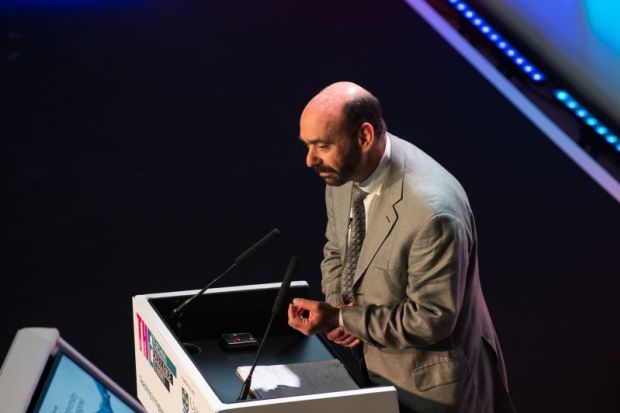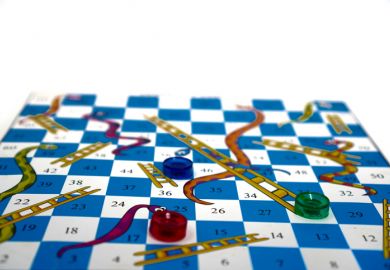Undergraduate education is “declining and failing” in US universities because students are not studying enough outside the classroom, an influential educationalist has claimed.
Speaking at Times Higher Education’s inaugural Teaching Excellence Summit, Richard Arum, dean of the University of California, Irvine’s School of Education, blamed falling levels of independent study by students on institutions, stating that they are failing to enthuse students to study or inspire them to prepare for lectures and seminars.
Professor Arum – co-author of the controversial 2011 book Academically Adrift: Limited Learning on College Campuses, which sparked worldwide debate on the quality of university learning outcomes – told delegates at the University of Glasgow that recent studies showed that US undergraduates were studying for just 12 to 13 hours a week on average in 2016. This is roughly half the level in 1960, when students committed an average of about 25 hours a week to independent study.
“A third of college students say they spend less than an hour studying alone a day,” said Professor Arum, who underlined that the “academic engagement of students is very low”.
Undergraduates now spend three and a half times more time socialising and engaging in recreational activities than they do on preparing for class, Professor Arum added.
This ratio is not surprising given the relatively easy demands of today’s degrees, he explained. “If you look at courses today, half of them do not require 20 pages of writing over the course of a semester,” said Professor Arum, who added that another “dark truth” known by academics was that students often did not show up to class.
Even at Harvard University, lecture theatres are sparsely attended, he added, stating that students “do not show up – a third of students were not in their seats”, he said.
“What we are selling or doing is not connecting with students,” Professor Arum said. “They are changing, and their expectations are changing – we are about a decade behind in meeting students where they are.”
Such low levels of academic engagement also pointed to a lack of academic rigour in many universities because “students are getting B+ [grades on average] even when they are studying for less than an hour a night”, he added.
In Academically Adrift, Professor Arum and Josipa Roksa claimed that nearly half of undergraduates showed no substantial improvement in critical thinking, reasoning or writing skills in their first two years of study. At the THE summit, he said that 36 per cent of students had shown no discernible improvement in their critical thinking skills as measured by the Collegiate Learning Assessment system, which he admitted was a much-criticised measurement.
Professor Arum also highlighted low levels of civic engagement among US students, reporting that a recent survey found that a third of students read the news, in print or online, no more than once a month, and that 39 per cent admitted to never having had a political discussion or to having only one a month.
“Our liberal political order is under siege, and our education system is partially to blame for this,” Professor Arum said.
The sociologist also urged educators to move beyond the traditional “research versus teaching” debate, saying that it was time for more research into what constituted good teaching and how student learning outcomes could be measured effectively.
“People will look back in 100 years’ time and will be puzzled and incredulous that universities had amassed so much impressive research capacity but had failed to use this to tackle the problem of undergraduate education,” Professor Arum said.
“It is easier to find researchers willing to march for science against President Trump than to conduct research that will improve undergraduate education.”
Leading global universities such as Harvard and Glasgow should take a lead in the search for effective measures of student learning, building on current measures of critical thinking now being used in the US, Professor Arum added.
“If you do not commit to the science of learning outcomes, then none of the lower-tier [universities] will – you have to do it because it is a moral imperative and you will become a model for the rest to follow,” he said.
jack.grove@timeshighereducation.com
Watch our interview with Richard Arum after his opening plenary speech at the Teaching Excellence Summit
Register to continue
Why register?
- Registration is free and only takes a moment
- Once registered, you can read 3 articles a month
- Sign up for our newsletter
Subscribe
Or subscribe for unlimited access to:
- Unlimited access to news, views, insights & reviews
- Digital editions
- Digital access to THE’s university and college rankings analysis
Already registered or a current subscriber? Login










